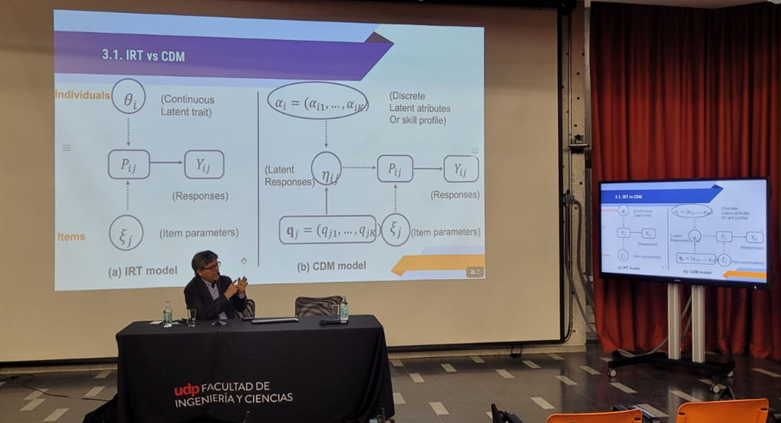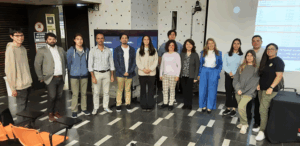Data Science Conference Offers Latin American Perspectives
Alba Martínez Ruiz, Universidad Diego Portales, and Katherine B. Ensor, Rice University

Jorge Luis Bazán of the University of São Paulo presents “Classification in Educational Data: Cognitive Diagnostic Models Using Different R Packages” during the Workshop on Data Science and Education.
The International Conference on Data Science, ICDS2023, took place November 8–10, 2023, and brought together both seasoned and young researchers to discuss statistical learning and data science. Organized by the Universidad Diego Portales School of Industrial Engineering and cosponsored by the ASA, the conference consisted of in-person, hybrid, and virtual sessions and aimed to provide an overview of state-of-the-art research in statistical learning and data science, add diverse voices to the global debate in this area, and enrich the interdisciplinary dialogue between theory and application.
Members of the scientific committee received 135 abstracts from people in 35 countries. The program included eight keynote speakers, 22 invited paper sessions, four contributed paper sessions, and nine poster sessions. Keynote speakers included the following:
- Peter Filzmoser, Vienna University of Technology, Austria, “Explainable Outlier Identification for Matrix-Valued Observations”
- Diego Gallardo, Universidad del Bío Bío, Chile, “A Parametric Quantile Beta Regression for Modeling Case Fatality Rates of COVID-19”
- Trevor Harris, Texas A&M University, “Multi-Model Ensemble Analysis with Neural Network Gaussian Processes”
- Miguel de Carvalho, University of Edinburgh, United Kingdom, “Data Science for Extreme Events”
- Karol Suchan, Universidad Diego Portales, Chile, “Workload Distribution in the Yard of a Multipurpose Port Terminal in Chile”
- Katherine Ensor, Rice University, “Statistics: A Foundation for Innovation” and “Multivariate Nonlinear Time Series Nowcasting with Spatial Considerations and Applications to Wastewater Epidemiology”
- Fabrizio Ruggeri, National Research Council Istituto di Matematica Applicata e Tecnologie Informatiche, Italy, “Advances in Adversarial Classification”
- Paulo Canas Rodrigues, Federal University of Bahia, Brazil, “The Usefulness of Singular Spectrum Analysis in Hybrid Methodologies for Time Series Forecasting”
- American Statistical Association
- International Statistical Institute
- International Association for Statistical Computing
- International Society for Business and Industrial Statistics
- Sociedad Chilena de Estadistica
Conference topics included recent advances in outlier detection techniques and robust data analysis, Gaussian processes and deep neural networks, multivariate analysis, extreme value theory, spatio-temporal modeling, high-dimensional data analysis, multiblock data analysis, public health data science, modern statistical visualization, symbolic data analysis, effective computation and learning, optimization and stochastic modeling, time series analysis, R project package development, and machine learning.
Presenters also gave talks about applications to societal problems such as education, climate change, women in data science, health and epidemiology, the economy, and engineering.
In total, there were 108 presentations, including from undergraduate and post-graduate students. Presentations may be submitted to a special issue of the Applied Stochastic Models in Business and Industry Journal until January 30. Guest editors are David Banks, Alba Martínez-Ruiz, David F. Muñoz, and Javier Trejos-Zelaya.
Workshops on Data Science
Prior to the conference, two data science workshops were held on education and climate change. The Workshop on Data Science and Education was organized by Jorge Luis Bazán from the University of São Paulo, Brazil. The program included five presentations focused on cognitive diagnostic models and educational assessment in Chile, Brazil, and the United States using artificial intelligence, Bayesian networks, latent models, and R project packages.

Leaders and participants of the Workshop on Data Science and Climate Change gather for a quick smile at the Universidad Diego Portales.
The Workshop on Data Science and Climate Change was organized by Rodrigo Salas from the University of Valparaiso, Chile, and Orietta Nicolis from Andres Bello University, Chile. The program included five presentations with applications of machine learning to the prediction of short-term stream flows in several basins of Chile, the prediction of seismic events, the spatio-temporal analysis of Chilean drought, the functional analysis of spatio-temporal data, and the application of spatial econometric model in the spatio-temporal modeling of forest fires in Brazil.
A milestone for the Chilean and Latin American Scientific Community, the International Conference on Data Science is the first international conference held in Chile and supported by the International Statistical Institute and American Statistical Association.


















Leave your response!